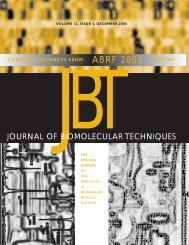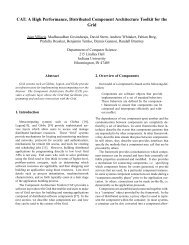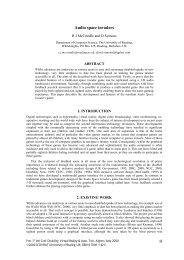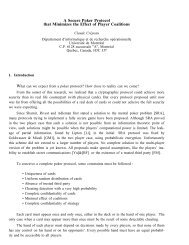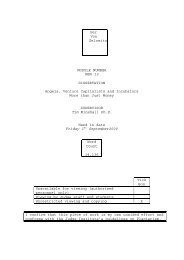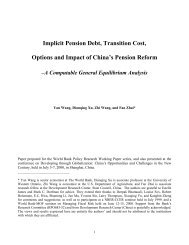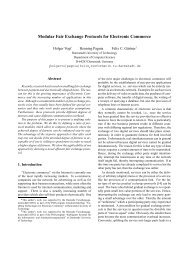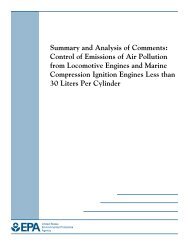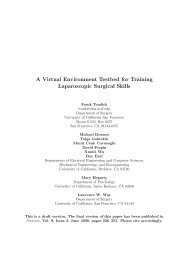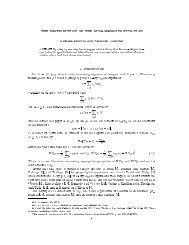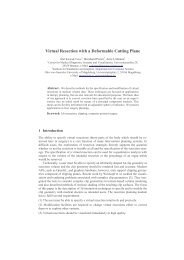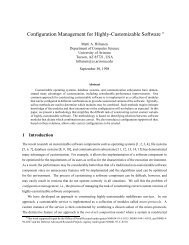Hydrology and water management in the humid tropics: proceedings ...
Hydrology and water management in the humid tropics: proceedings ...
Hydrology and water management in the humid tropics: proceedings ...
Create successful ePaper yourself
Turn your PDF publications into a flip-book with our unique Google optimized e-Paper software.
Second International Colloquium on<br />
<strong>Hydrology</strong> <strong>and</strong> Water Management <strong>in</strong> <strong>the</strong> Humid Tropics<br />
out). The fund<strong>in</strong>g was from several sources: UNESCO, SOPAC, CSC <strong>and</strong> at a<br />
national level.<br />
In a similar manner, I am acutely aware that this region is occupied by some of<br />
<strong>the</strong> best remnants of montane cloud forests. Such forests on a global scale are one of<br />
<strong>the</strong> last sources of potable surface <strong>water</strong> <strong>in</strong> <strong>the</strong> <strong>humid</strong> <strong>tropics</strong>. They also have high<br />
conservation value for <strong>the</strong>ir biodiversity. Yet, we know comparatively little of <strong>the</strong>ir<br />
<strong>water</strong> balance <strong>and</strong> process hydrology, biological processes <strong>and</strong> biodiversity, <strong>in</strong><br />
comparison with lowl<strong>and</strong> tropical moist forests.<br />
I hope that one of <strong>the</strong> achievements of this Colloquium is to encourage at least<br />
one field project devoted to Cloud Forest <strong>Hydrology</strong> <strong>and</strong> I would like to propose<br />
CATHALAC be<strong>in</strong>g a focal po<strong>in</strong>t to assist <strong>in</strong> its coord<strong>in</strong>ation. In fact I have been<br />
try<strong>in</strong>g to encourage such developments with my Ne<strong>the</strong>rl<strong>and</strong>s’ colleagues <strong>and</strong><br />
CATHALAC s<strong>in</strong>ce 1997, with <strong>the</strong> South Pacific model as a possible framework. The<br />
United States is already operat<strong>in</strong>g a project <strong>in</strong> Puerto Rico <strong>in</strong> <strong>the</strong> Luquillo<br />
experimental bas<strong>in</strong>s <strong>and</strong> scientists from <strong>the</strong> Ne<strong>the</strong>rl<strong>and</strong>s have participated <strong>in</strong> this<br />
project, as well as <strong>in</strong> a separate one <strong>in</strong> <strong>the</strong> Blue Mounta<strong>in</strong>s of Jamaica. I am also<br />
aware of excellent expertise <strong>in</strong> Colombia, Panama <strong>and</strong> Costa Rica, for example, as<br />
evidenced by recent publications <strong>in</strong> <strong>in</strong>ternational journals. So I see <strong>the</strong>re is a good<br />
basis for regional <strong>and</strong> <strong>in</strong>ternational co-operation <strong>in</strong> <strong>the</strong> Lat<strong>in</strong> America <strong>and</strong> Caribbean<br />
region.<br />
Support<strong>in</strong>g field projects requires field technical skills. Significantly, at a<br />
recent meet<strong>in</strong>g of <strong>the</strong> International Steer<strong>in</strong>g Committee on Humid Tropics for SE Asia<br />
<strong>and</strong> <strong>the</strong> Pacific Region <strong>in</strong> Kuala Lumpur, November 1997, this issue was raised <strong>in</strong> <strong>the</strong><br />
context of data logger failure <strong>in</strong> a Swedish Government supported, Department of<br />
Irrigation <strong>and</strong> Dra<strong>in</strong>age, urban hydrology project <strong>in</strong> Kuala Lumpur, Malaysia.<br />
I am aware of similar problems <strong>in</strong> <strong>the</strong> University of Sao Paulo urban<br />
hydrology project. The urban hydrology issue is one of <strong>the</strong> most critical <strong>in</strong> <strong>the</strong> <strong>humid</strong><br />
<strong>tropics</strong> <strong>and</strong> <strong>the</strong> least researched. It has been foreseen, <strong>the</strong>refore, that Australia will<br />
host a data base/data <strong>management</strong> workshop, <strong>in</strong>clud<strong>in</strong>g data logger ma<strong>in</strong>tenance for<br />
two participants from, respectively, SE Asia <strong>and</strong> <strong>the</strong> South Pacific who are currently<br />
active <strong>in</strong> field projects. If successful, <strong>the</strong>n this may be extended to o<strong>the</strong>r <strong>humid</strong><br />
tropical regions us<strong>in</strong>g exist<strong>in</strong>g field projects l<strong>in</strong>ked with <strong>the</strong> IHP where possible.<br />
We are now <strong>in</strong> a period where at a national level, support for scientific<br />
research is commonly locked <strong>in</strong>to short-term economic cycles of only one to three<br />
years. There is a paradox here that whilst <strong>the</strong> Global Change issues (<strong>in</strong>clud<strong>in</strong>g those<br />
for <strong>water</strong>) are based on long-term questions, <strong>the</strong> fund<strong>in</strong>g response at a national level is<br />
mostly short-term. In that regard, UNESCO has an advantage <strong>and</strong> I see it as our<br />
responsibility to prepare for <strong>the</strong> longer-term environmental issues. Accord<strong>in</strong>g to<br />
CIFOR (Centre for International Forestry Research), with<strong>in</strong> <strong>the</strong> next 20-30 years<br />
current deforestation rates will mean much reduced accessibility for forest products.<br />
Thus whilst global attention is be<strong>in</strong>g devoted to deforestation, we must now turn our<br />
focus towards support<strong>in</strong>g <strong>in</strong>ter-discipl<strong>in</strong>ary efforts at reforestation of degraded l<strong>and</strong>s,<br />
<strong>in</strong>clud<strong>in</strong>g <strong>the</strong> use of native species. I am pleased to report that at <strong>the</strong> <strong>in</strong>vitation of <strong>the</strong><br />
Karnataka Forest Department, India, UNESCO <strong>in</strong> collaboration with <strong>the</strong> National<br />
Institute of <strong>Hydrology</strong>, Belgium, has commenced a project that assesses <strong>the</strong><br />
hydrological impact of various reforestation strategies of degraded l<strong>and</strong> on <strong>the</strong> <strong>water</strong><br />
cycle. This project also addresses <strong>the</strong> controversial issue (<strong>and</strong> yet with m<strong>in</strong>imal<br />
scientific evidence) that deforestation <strong>in</strong>creases floods <strong>and</strong> conversely decreases dry<br />
wea<strong>the</strong>r flow. It is <strong>the</strong> dry wea<strong>the</strong>r flow that is a major <strong>water</strong> supply at <strong>the</strong> village<br />
level dur<strong>in</strong>g periods of drought. People need both <strong>the</strong> products from forests <strong>and</strong> <strong>water</strong><br />
21



